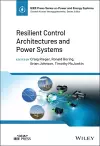
Resilient Control Architectures and Power Systems
4 contributors - Hardback
£112.95
Craig Rieger is the Chief Control Systems Research Engineer at the Idaho National Laboratory (INL), pioneering multidisciplinary research in the area of next generation resilient control systems. In addition, he has organized and chaired nine Institute of Electrical and Electronics Engineers (IEEE) technically co-sponsored symposia and one National Science Foundation workshop in this new research area, and authored more than 40 peer-reviewed publications. He received his PhD in Engineering and Applied Science from Idaho State University in 2008. He is a senior member of IEEE, and has 20 years of software and hardware design experience for process control system upgrades and new installations. He has also been a supervisor and technical lead for control systems engineering groups having design, configuration management, and security responsibilities for several INL nuclear facilities and various control system architectures.
Indrajit Ray is a Professor at the Computer Science Department at Colorado State University. He received his PhD in Information Technology from George Mason University in Fairfax, VA in 1997. His main research interests are in the areas of data and application security, network security, security modeling, risk management, trust models, privacy and digital forensics. He is a member of the Data and Applications Security Group, the Network Security Group, and the Software Assurance Laboratory at Colorado State University. His research has been funded by the U.S. National Science Foundation, the Air Force Office of Scientific Research, the Air Force Research Laboratory and the Federal Aviation Administration. He is a member of IEEE Computer Society, ACM, ACM Special Interest Group on Security Audit and Control, IFIP WG 11.3 on Data and Applications Security and IFIP WG 11.9 on Digital Forensics.
Quanyan Zhu is an Assistant Professor at the Department of Electrical and Computer Engineering at the Polytechnic School of Engineering at the New York University, NY, USA. He received his PhD in Electrical and Computer Engineering from the University of Illinois at Urbana-Champaign in 2013. His main research interests are in the areas of Game Theory and Applications, Resilient and Secure Socio-Cyber-Physical Systems, Adversarial Machine Learning and Signal Processing, Human-Robot Interactions, Internet of Things, Game and Decision Theory for Cyber Security, Economics and Optimization of Infrastructure Systems, and Resource Allocations in Communication Networks.
Michael Haney is an Assistant Professor of Computer Science for the University of Idaho and a cybersecurity researcher for the Idaho National Laboratory. He received his master's and doctorate in computer science from the University of Tulsa in 2013 and 2015, respectively. Currently, his research interests are in data visualization, specifically visualizing network and system log data to improve intrusion detection and response for large-scale networks. He studies cyber-security issues of energy assurance supporting a more resilient "smart" infrastructure. His focus here lies in honeypot research — creating systems that mimic real power generation systems, oil refineries or water treatment plants, and recording and studying the cyber-attacks against these systems.